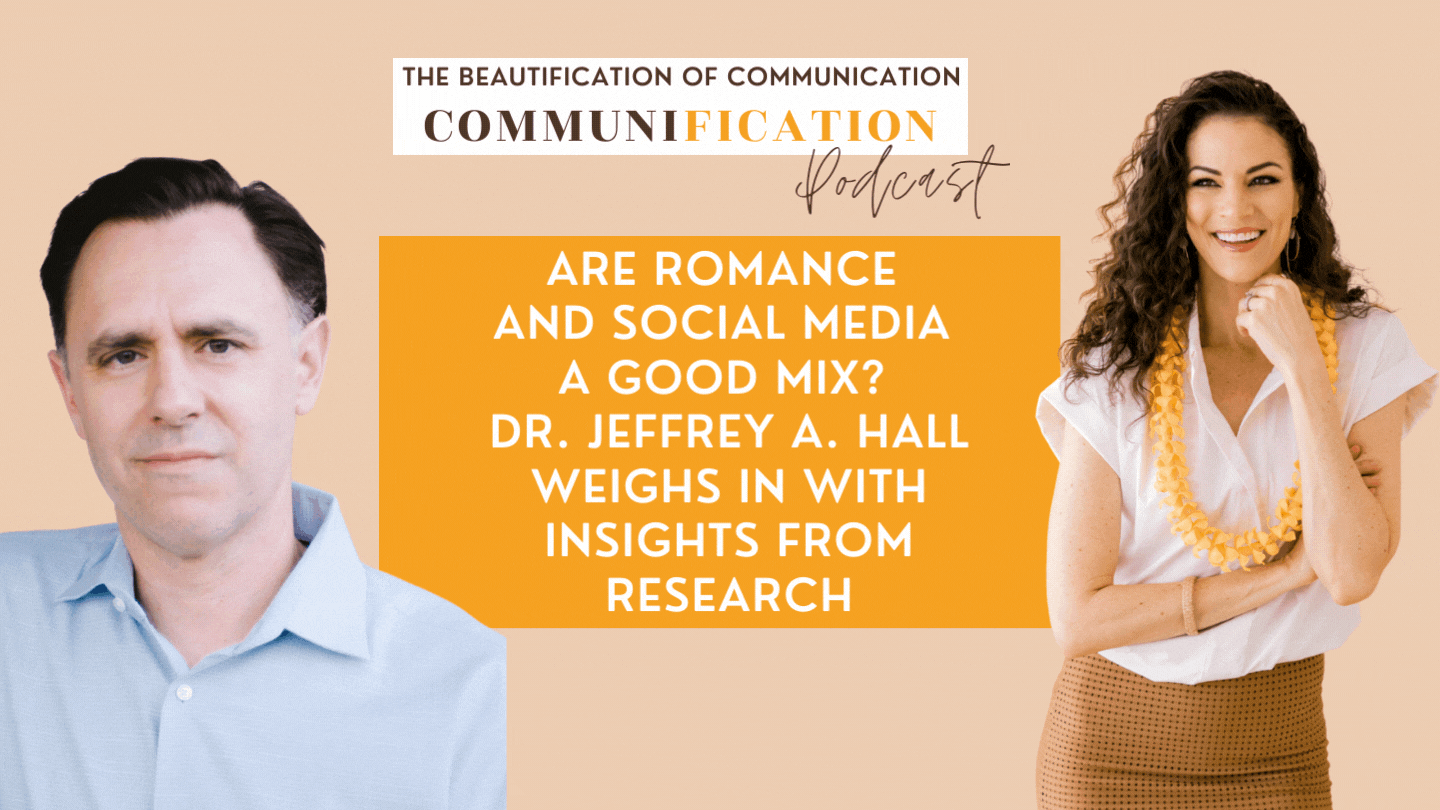Ep. 21: - Are romance and social media a good mix? Dr. Jeffrey A. Hall weighs in with insights into current communication research
Below you will find the show notes for “Episode 21” of the Communification Podcast.
Mahalo for listening! Welcome to the ‘ohana!
Mahalo to Vitalitea Hawaii for their donation to the Maui Nui Marine Resource Council. Tap the hyperlinks to learn more about this wonderful local business and great non-profit.
Main takeaways
Exploration of the relationship between self disclosure and intimacy
The channel (text, social media, video chat, FTF, etc…) you use matters
Romantic relationships have the benefit of FTF interaction to clear up any communication issues caused by online activities
In some romantic relationships, mate-guarding happens. This can lead to one or both partners “giving up”
Flirting in online and offline spaces is VERY different
In person, people are less than 30% accurate at detecting when someone is flirting with them
Our lives are improved when we are acting in communication with one another
Time codes
[03:50] SOCIAL PENETRATION THEORY AND THE RELATIONSHIP BETWEEN SELF DISCLOSURE AND INTIMACY
[07:24] ONLINE VERSUS OFFLINE DISCOURSE IN THE CONTEXT OF SOCIAL PENETRATION THEORY
[07:18] DOES THE CHANNEL OF COMMUNICATION MATTER FOR RELATIONSHIP DEVELOPMENT?
[08:30] HOW DOES SYNCHRONY FACTOR IN?
[09:17] WHAT ARE THE POSITIVE AND NEGATIVE IMPACTS TO ROMANTIC RELATIONSHIPS WHEN USING DIGITAL MEDIA TO COMMUNICATE?
[13:08] LET’S TALK ABOUT FLIRTING IN ONLINE AND OFFLINE SPACES
[16:00] RESEARCH-BASED COMMUNICATION TOOLS TO COMMUNICATE BETTER WHEN IT COMES TO DEVELOPING AND MAINTAINING RELATIONSHIPS ONLINE
Dr. Jeffrey A. Hall bio
Jeffrey A. Hall is a Professor of Communication Studies at the University of Kansas. He is the former Chair of the Human Communication and Technology Division of the National Communication Association and the current Chair of the Interpersonal Communication Division of the International Communication Association. He was awarded the Early Career Award from the Interpersonal Communication Division of the National Communication Association, and is the founding editor of Human Communication & Technology. His 2020 book, Relating Through Technology, is the recipient of several awards. He has been interviewed by National Public Radio, New York Times, Wall Street Journal, USA Today, Time Magazine, Washington Post, Financial Times, CNN… and the Communification Podcast.
EPISODE 21: Are romance and social media a good mix? Dr. Jeffrey A. Hall weighs in with insights from current communication research
Malika:
Let's step back and look at the big picture. So people don't just seek out and start relationships on online dating sites. Social media has become a tool for romantic relationship development and maintenance. I know this very intimately. It's how my husband and I began our courtship. So I thought to kick off this discussion, it would be great if you could define social penetration theory and talk about it in the context of relationship development and maintenance in digital spaces.
SOCIAL PENETRATION THEORY AND THE RELATIONSHIP BETWEEN SELF DISCLOSURE AND INTIMACY
Dr. Hall:
Yeah, so Social Penetration Theory is another one of those classic communication theories that we teach our introductory classes. And it is based on one fundamental relationship between two things, which is self disclosure and intimacy.
So the basic kind of correlation between those things, that when we self disclose more, we experience more intimacy with people is the hallmark of that theory. What it says then is through the process of self-disclosure we basically go through relational stage progression. So we get closer into deeper levels of information, a deeper level of penetration into the person's persona and who they are through the process of self disclosure.
One thing that's important about this is that it actually seems to be the case that this is one of those relationships that's really very much bivariant.
Meaning if I self disclose, I tend to like you more. And if I like you more, I tend to self disclose.
So what's fascinating is it does suggest that there's a process in ourselves, which says that in the process of sharing ourselves with one another, we actually feel closer to each other.
Even if that person is a stranger or even if that person isn't somebody that we know particularly well. So stranger on the plane phenomenon, right? Sitting next to someone in a seat, in a plane, you can feel quite close to them, through the process of telling your life story and getting excited about that and social penetration theory, although tends to focus on more slow development of relationships, romantic or friendship. We can also think about the idea that quick heavy amounts of self disclosure can really be feelings of almost like elation when you meet somebody to just share all those things with cuz they're sharing the same thing in their own life.
Malika:
Is there a difference in doing that face to face and doing that online and how do the two mix and... because you start to do both once you move offline.
ONLINE VERSUS OFFLINE DISCOURSE IN THE CONTEXT OF SOCIAL PENETRATION THEORY
Dr. Hall:
True. I would say what's interesting is as a person who studies comparative. Comparative... is online disclosure, offline disclosure, what's the order?
There's been a lot of very fascinating research that have tested the idea is there's something special about face to face connection. And remarkably there appears that there is something really specific about it that has not yet been replicated in studies that have used video chat or texting or otherwise.
It seems to be the case that face to face communication moves quickly... more quickly through feeling close and connected, enjoying and liking another person, even than something like video chat, which you would think is almost a simulation of it. So it's not just the number of words exchanged, cuz video chat should be enough for that.
It's not just getting vocalic signals or kinesic symbols through people's facial expressions or through their body language. There's something specific about a face to face interaction that seems to build people's relationships more closely.
That said, it does seem to be also the case that in online media people can reach levels of closeness and development. It takes more time.
So people have to be more patient. They have to be more willing to write longer compositions of, I know people don't usually use email anymore, but go back and forth through text. But sometimes there is a value to really engaging in self-disclosure processes. Whether it's online or offline.
DOES THE CHANNEL OF COMMUNICATION MATTER FOR RELATIONSHIP DEVELOPMENT?
Malika:
Does it matter if it's social media versus text versus email?
Dr. Hall:
Remarkably there is research that actually suggests that it does, right? So the directed forms of communication, texting one to one texting suggests that it has a faster relationship development. Social media, which tends to, if it's not directed, so if it's not a DM, it's not a snap, but it tends to be broadcast, then it tends to be very slow relationship development.
Now that doesn't mean that people don't develop a strong impression of someone online. In fact, people actually can develop an accurate and strong impression of someone looking at their social media profile or their online dating profile for that matter.
So the idea here is that we do have an impression of another person, but the development of a relationship is something different because where I stand relationship development is something that requires a two way dyadic kind of process.
Impression formation can be done with a celebrity. There are celebrities who I think are really fascinating people. What am I basing that on? What I see of them in movies or musicians who I love, like that's based on almost nothing. I don't know if they would like me. So that's the difference between getting a perception of somebody like through their social media profile versus getting the dyadic impression.
HOW DOES SYNCHRONY FACTOR IN?
Malika:
Cause you need the communication, it needs to be two way. So maybe it's that asynchronous, like how asynchronous is it on that scale? Where text feels a little bit more immediate. Granted people can say oh, I didn't see your text, whatever, but that feels way more immediate than an email or a social, even a social media DM or message.
Dr. Hall:
So synchrony is one of the facets of communication that does seem to propel speed of development.
But I would say there's still limits to that. So that surprisingly, even things like video chat aren't sufficient.
So you do see a step down process where face to face, telephone calls, which is a big one, video chat somewhere in between there, texting, DM or social media contact, and then things which are very publicly displayed or in terms of relationship development mechanisms.
Malika:
You are just so interesting Dr. Hall.
Dr. Hall:
You're flattering me.
Malika:
Oh my goodness. Okay. So what are some negative and positive impacts to communication within a romantic relationship? So when it comes to the development and the maintenance of that relationship, using those online tools.
WHAT ARE THE POSITIVE AND NEGATIVE IMPACTS TO ROMANTIC RELATIONSHIPS WHEN USING DIGITAL MEDIA TO COMMUNICATE?
Dr. Hall:
So there's a lot of wonderful work out there and I want to, there's a wonderful colleagues that we have in communication that are focusing on these issues. I think of Jesse Fox from OSU (link to his research below), who's doing some really cool stuff. I think of also there are people who do things like electronic surveillance, which tends to have kind of a more negative connotation that has to do with issues of watching your partner.
And so there's a lot of wonderful work being done on this. I would say, interestingly that I'm not totally convinced that there is a clear positive or negative. I would say that what's interesting is all of them are mixed. None of them are pure positive, and none of them are pure negative. And this is why.
First thing is for all relationships, except for long distance romantic relationships, you have the privilege, the benefit of seeing your partner face to face. As a consequence, ambiguities, idiosyncratic jokes, kind of things that are very personalized or otherwise can, be brought through in your online channel because of your face to face connection.
You can make a joke about something that happened to you earlier in the day, you can clarify a conflict and romantic couples talk about the process that when they start to have conflict bubble up through media, they know quickly to move to a channel that is able to handle that conflict. They can speedily adapt.
So I think that the evidence generally suggests that when you have the privilege of face to face contact, all of those other mediated forms of communication are really ancillary. They may be complimentary. Oftentimes there are some benefits to keeping in touch during the day and sending sweet messages and memes that a person would love, but that's an extension of your kind of love and affection to the person through another channel.
And as a researcher, it just explains less variance in the overall phenomena than does face to face.
However, there are really key things that are different. So the ones that I mentioned before I think are fascinating. One is about things about public couple presentation on online spaces.
This one cracks me up because couples fight about this one.
They're like, why did you post that picture? And shouldn't you say that you're in a relationship and what are you saying about our relationship and why are you talking to her and why are you liking that picture and who are you following? That stuff cracks me up, partly because that, in some ways it speaks to the amount of adoration and love that we have for a partner that we wanna watch them.
This is called mate guarding. So it's a good thing.
And it's jealousy provoking, which is a mixed bag, but it also is really frustrating. Like it really amuses me at some level as a researcher because it's clearly something people feel passionately about for good reason. I care about you, but it always tends to be a bit of a drag on the relationship.
Malika:
What do you do? I think, I feel like everyone does that to a certain extent.
Dr. Hall:
What a lot of people do is they give up, right? So some people I've heard... there is this wonderful research by Aimee Miller out of Illinois State University (links to research below in references). And she does this work that says that there's a lot of ironies in it.
Where people fight because that their lack of amount of contact they have with each other, as well as the amount of contact they have with each other. That some people give up by saying just tell me what to put on our profile, I'll put whatever you want, or they just stop using it.
They stop making a public presentation of self so as to preserve, their kind of sense of relational fidelity publicly cuz they don't want to upset their partner. So I think what's unfortunate about this kind of thing is that if it becomes too conflictual, then a lot of people will actually maybe have to hide or maybe have to not engage in it.
It's probably healthier if we can actually say, those kind of things hurt me. Yeah. If you put up that and do it privately and say, you. I see it, but also be thoughtful before you really wanna take offense to everything that your partner might do, cuz chances are they probably didn't mean it in any way that was harmful. They were just observing the social media world as they did prior to being a relationship with you.
LET’S TALK ABOUT FLIRTING IN ONLINE AND OFFLINE SPACES
Malika:
Yes. You study flirting. How is flirting different in online and offline spaces?
Dr. Hall:
So flirting in offline spaces is so much more likely to be ephemeral. Just a moment. Just a tiny little hint, eye contact that lasts just a little bit longer, a second glance.
What we call actually, there are these little kind of micro expressions that people conceal after they express them. So things are on smiling and laughter and almost even showing kind of faces, which are more coy. People are very conscious to show them, but they also quickly mask them.
So there's all of these wonderful, tiny, very in the moment ephemeral things that happen in flirting in person. Online flirting has to be bald on record, as they say in the argumentation and persuasion literature. You have to be really pretty clear. Now, you can use emoji, you can use memes, you can use jokes to convey that, but those are also similar to offline verbal wordplay, making jokes, being creative or clever are also ways that you can be flirtatious offline.
But I think what's fascinating is that there's so much missing when we engage with people online in part, because we work so hard to conceal it offline.
Malika:
What do you mean by that? That we work so hard to conceal it offline.
Dr. Hall:
Very few people are comfortable showing how interested they are in another person when they first meet them.
They're careful. And the reason is they could get hurt. They could be embarrassed. They could think that they're really being charming and whatever, and the other person's not into them. The other person is already in a relationship, as I mentioned before. It could be really opportunities to feel embarrassed or to feel that your self presentation is being challenged.
As a consequence, people are careful when they flirt when they're offline in ways that tend to allow for a lot of kind of nuance. Again, there are exceptions to this in environments in which that people are drinking, in the environments which are promoting a more hookup culture where men are given license to be the aggressor because those sorts of places are places where men behave in those ways.
Malika:
College.
Dr. Hall:
College, broadly. The flirting tends to be much more, more intense and much more like aggressive, but in the research that I've done, what I find is actually it's hard to detect flirting. One of the studies that I published that I was really proud of is we found that people were almost 80, or to 85% accurate, to know when someone was not flirting with them.
Like they, they knew it, you're not interested in me. I get that.
But they were less than 30% accurate of detecting flirting when it was happening.
They missed it more often than they saw it. And so what that means is that flirting is hard to detect. Online, flirting, by contrast, you can go back and look at the message again on your mobile and be like, what do they mean by that?
But at least you have a record.
Malika:
Oh, wow. That is, we could do a whole podcast just on that. But we're wrapping it up. I can't keep you forever. So why don't we end with your research based communication tools so that listeners can communicate better when it comes to developing and maintaining their relationships online.
RESEARCH-BASED COMMUNICATION TOOLS TO COMMUNICATE BETTER WHEN IT COMES TO DEVELOPING AND MAINTAINING RELATIONSHIPS ONLINE
Dr. Hall:
Absolutely. One of the things that I finished off my book relating through technology with is something I worked very hard on is to convey a message that I thought could, culminate all, or bring together all the research that I had done in that book. And in that last chapter, I talk about how important it is to live intentionally when it comes to making time for people, we are in an environment which is gonna pull us away from one another.
And during the COVID pandemic, it was awful. So many people experienced loneliness and depression and isolation. And we relied so much more on our mobile tools to connect, but mobile tools to connect and social media tools to connect require you to be very thoughtful and intentional about making time for one another, because those kind of things are not built for the purpose of connecting us to each other, they're built to distract us.
They're built to have our eyes on a page or on some sort of program. And I want to say to your listeners, something that's very important to me is that these relationships that you develop, particularly if you're a young adult, particularly for a person in college or right after college, that the importance of developing long-term friendships with people and keeping in touch with them is so critical.
And those friends, if you keep in touch with them, you make those phone calls, you schedule those video chats, you visit them face to face, you find times to have coffee, you make lunch appointments, you keep doing it. This is what really importantly matters for your wellbeing your whole life.
Our lives are improved when we are acting in communication with one another, and mobile and social media are only a tool to get there.
And if we do not use those things in an intentional fashion, they will simply be a time suck that is for the sake of basically making more money for meta or Mark Zuckerberg or who else is gonna come along.
Malika:
Oh, that gave me chicken skin. I absolutely agree. And it's such an important lesson for all of us, and to be reminded of it because we might actually be aware of it, but it's so easy to just fall back into the scroll, scroll, scroll.
Dr. Hall:
And we all do. And I would point out that, it's true for parents with kids, it's true for working adults who have to commute long distances, it's true for young adults who are moving city to follow their dreams and their passion. It's true for college students who are going through COVID in the last couple years. It's true for all of us.
So I'm not certainly trying to cast any stones.
I'm only trying to say we are all in the human condition right now where the mobile and the technological devices, we have make it possible, but I worry we're not intentional enough about making sure it is actually happening.
Malika:
We're so excited to have you on the show to share your expertise with us.
I will put the links to the researchers Google scholar pages, so that anyone that's interested in pursuing this more and reading up more, that you can do that. I'm sure the listeners feel like they've learned a lot, just like I have. So thank you so much.
Dr. Hall:
Oh, it's a pleasure!
References
Dr. Jeffrey Hall’s Google Scholar page
Dr. Jesse Fox’s Google Scholar page
Dr. Aimee Miller-Ott’s Google Scholar page

















